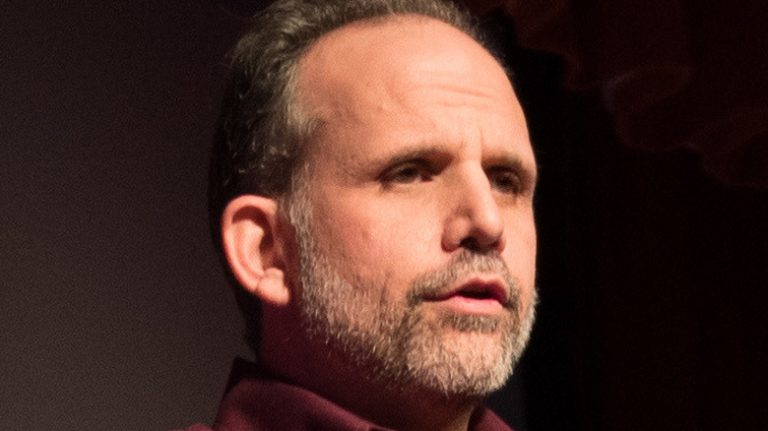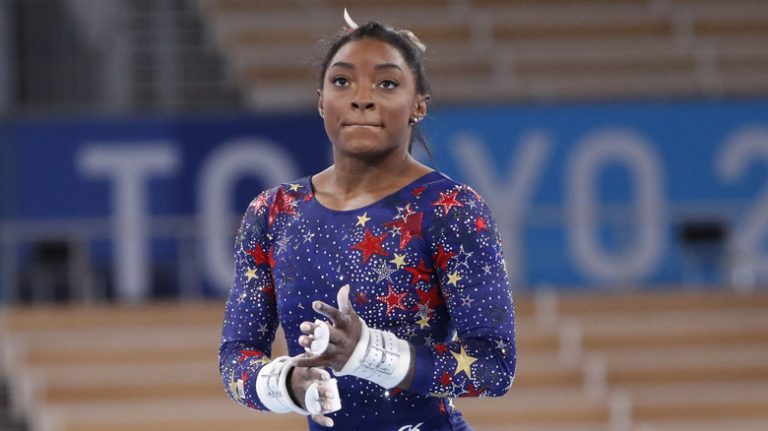Gianna Biscontini has always been fascinated by human behavior. She was the kind of kid who spent hours people-watching and wondering what makes us do the things we do. Biscontini’s curiosity about human behavior led her to pursue an undergrad degree in psychology. From there, she did the graduate and post-graduate level work required to become a Board Certified Behavior Analyst.
Since receiving her certification, Biscontini has brought her behavioral expertise to all kinds of different projects. She started a consulting firm called W3RKWELL that helps companies identify how their internal practices are leading to employee burnout, and aids those companies in implementing policies and programs that actually improve employee wellbeing.
Biscontini also uses her expertise to help women break out of the boxes in which society tries to contain them. She helps women examine the narratives that have shaped their lives, understand how those narratives have kept them from living authentically, and write new narratives for themselves. This work is at the center of her upcoming book, “F**kless: A Guide to Wild, Unencumbered Freedom.”
In an exclusive interview with Health Digest, Biscontini talked about her book, how to live your most authentic life, and how to avoid the burnout that we’re all feeling right now.
A fascination with human behavior

Can you start off by telling us a little bit about your background and what sparked your interest in human behavior?
I just really grew up wanting to work with people. So people were actually like, “Go do psychology.” So I got a bachelors in psych and ended up … I wanted to be a pediatrician growing up. And so I ended up working with children with autism for quite some time. Super rewarding and awesome. And the “gold standard credential” for working with children with autism is being a Board Certified Behavior Analyst. Even in college as a psychology major, I had no idea that was an option. And so I thought, okay, great. I’ll become a behavior analyst.
And [as] I grew up … I’ve watched behavior since I was a child. I would sit at my window and watch people outside and watch my neighbors interact. And I [kept] wondering, what makes you do that? The good, the bad, the ugly. Where is that coming from? How do you know [how] to be an adult? How do you learn how to drive? How do you learn how to have a partner and a romantic partner? I was always just really curious.
So when the BCBA credential became popularized through autism, I went to go do that. So it was graduate school and post-graduate work and that kind of thing. And the great thing about having a BCBA credential and being certified is that you can work anywhere behavior exists. So I left the clinical world after about 10 years and decided to go out on my own and see where else I could use this behavioral psychology.
Recognizing the narratives that rule us
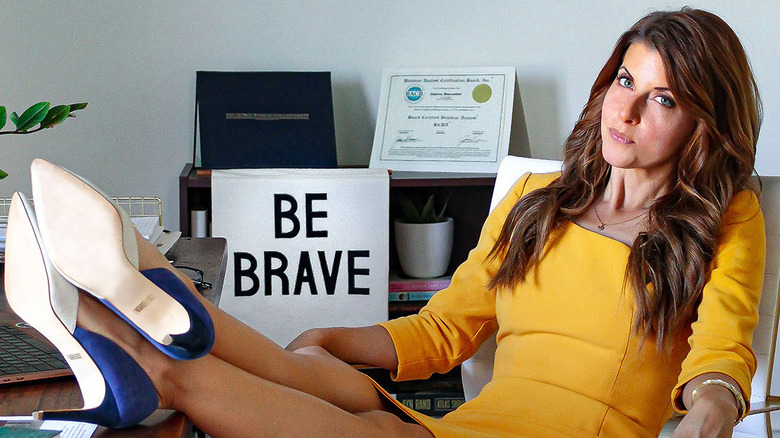
What made you want to focus specifically on the narratives that our society has about women and their roles?
Getting divorced! There was a [series] of events culminating in me choosing to leave my marriage. And so the first event was, I was severely taken advantage of by two businessmen in our field. They had gained my trust. Looking back, obviously, I see this, I didn’t really see it beforehand. These two businessmen became my friends. We had traveled internationally together on speaking circuits. They wanted to invest in my company. They asked for my business plan. They asked for all my assets. And so over a span of a year or two, they had gained access to all my assets, my business plan. One of them wanted to help me do sales at the company. But they were never producing any results or helping me. And they kept telling me they were going to help me and that I needed them. But number one, I didn’t, because I was more successful, and two, they ended up just taking all the information and trying to build their own thing with it. That was number one.
Number two was the Women’s World Cup win. The U.S. World Cup win in 2024. I grew up playing soccer and I wanted to watch that game forever. And of course, they just … [Megan] Rapinoe and [the team] just crushed it.
The night before I had been out with my husband at the time, and we were just having so many conversations about alcohol and he just kept telling me, “Just be happy, just be happy. Just come out with me, just be happy. We’re just having fun.” But I woke up that morning again and I was hungover, again. And I was just like, the one person who’s supposed to care about my health and wellbeing doesn’t, and I’m just supposed to shut up and be happy. And I’m just supposed to just go along with the man.
And then the World Cup win was like two hours later. And I was just like, “I’m not doing this anymore.” And it just shed light on the narratives. That was the first time I started pulling this thread and it was a confluence of, in that moment, I was able to look back at the businessmen situation and my interactions with these men and see that I was groomed and taken for granted. The narrative there was, “You are less. You need us. We’re going to fix you.” There were a couple narratives there.
The narrative that came with the Women’s World Cup win … They were busting the narrative, “Be small. Be demure. Just curtsy with your medal and walk away.” They were soaking champagne all over the place. They were not demure. They were not [acceding to] this demure tone expected of women. They were owning it.
And then the decision to leave my marriage, I saw a lot of narratives there of, “Be small, be dependent, be chosen. It’s not up to women. Men do the choosing, women are the chosen.” And so we have to accommodate and dim ourselves and “Be pretty, but not pretty enough. And be smart, but not too pretty.” And we’re in this glass box.
And over a couple months … I woke up October 1st, 2024 and was just angry and sat down and started writing about these narratives and piecing everything apart.
And looking back, after you had that big revelation, what other ways did you see that those narratives had really just shaped your life?
I had a lot of very Brené Brown-esque mini breakdowns. Every time I uncovered a new narrative, [it was] like the bombs that keep going off. “Oh my gosh, I got this from my father. Oh my gosh, I got this from that friend or from this person I thought who cared about me, which they probably did, but they were handing me a narrative that they probably thought was going to be helpful to me, but it ended up limiting me instead.”
And so once I started pulling that thread and identifying those narratives, with each narrative, I turned around at my life and went, “ugh,” and saw all these stories to support them. And then, of course, I talked to my female friends. I talked to my male friends. I talked to bosses and colleagues, and they just were nodding, “Yes, that’s happened to me. Of course.” And they have their own stories. And so those stories just kept reinforcing these narratives over and over and over.
Awakening to authenticity
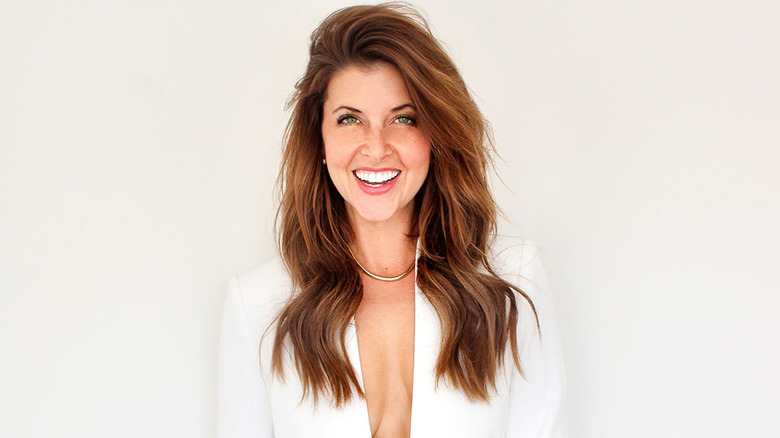
Lindsay Doyle
How can women start living outside the boxes that society tries to put them in?
Behavior is bidirectional. And so this is what’s irritating to watch about “female leadership summits” and “female this” and “women’s that.” And we silo women away in a way that tells them, “You are the problem and you should just speak up,” but then the woman goes to learn how to speak up, because maybe she couldn’t do that before. Most women can. They’re just not in the environment that receives her power or thoughts very well.
And so women go and learn these skills and they go back into an environment that doesn’t receive. It doesn’t receive her power. And as a behavior analyst, I can say, “Well, I can teach you anything.” But if I send you back into an environment that not only doesn’t reward it, but punishes it, you’re not going to continue to do that thing.
I think it’s really tempting to tell women, “Just speak up. Just know your value and just do that.” All of that, yes! But when we say, “Just,” we also send a message that it’s easy. And that she’s going to walk into a world that’s going to gracefully receive this thing that she’s doing. And we know that’s not true.
So yes, I love speaking to women and coaching women to piece that out. There’s always this fear and hesitation of, “Well, if I … Yeah, but …” And I talk about this in my book, the “Yeah, but.” It’s like, “Well, what if you come up with something to say next time, so you don’t feel so small and powerless?” “Yeah, but I’ll get in trouble.” “For what?” “Yeah, but they won’t like it.” “So?” “Yeah, but it’s not that big of a deal, I guess.” “Are you sure?” And so it’s helping women go, “Oh my gosh, I just accommodate and orbit around everyone else.” So I think that awareness and that work is there for women to do.
However, then we’ve got to turn around and talk to everyone else. And say, “Hey, when she comes and says, ‘I want to raise,’ or, ‘I’m going to be spending more time with my family and here’s a plan for that.’ Or asking for something in a relationship or refusing to be fixed, chosen, dependent, sexy but sweet, everyone’s version of acceptable, being everything to everyone. When she refuses to buy into those boxes and she breaks outside of them, instead of going, ‘No, no, no, no, no. Come back, come back to your box. I don’t like this. You’re out of control. I need to control this,’ we need to say ‘good for you.'”
Encourage varieties of women like we encourage varieties of men and varieties of individuals. That’s how the world becomes more interesting. First of all, it’s much more healthy for our mental health and physical health. It [generates] bursts [of] creativity when we take the shackles off of what a woman’s supposed to be and just allow her to be herself. And so I think it’s understanding this global story that women are something to be fixed.
We know what we’re doing. We just need you to get out of the way and stop telling us to be different because it halts us and it limits us. And it’s confusing to be told to be completely different when you don’t need to be. We just need to receive, and women need to do this to other women as well. We need to receive varieties of women who hold power and authenticity and encourage people to be themselves.
‘Living from the inside out’

Lindsay Doyle
What does living an authentic life mean to you?
Living from the inside out. In psychology, we talk about, are you internally controlled or are you externally controlled? Do you eat lunch because the clock strikes 12:00 and the clock tells you it’s lunch? Or do you eat lunch when you have that internal feeling of hunger, regardless of when everybody else is eating lunch? You’ve got to learn that it’s okay, if you’re hungry at 11:00, have lunch! If you’re hungry at 2:00, have lunch! … To listen to that internal locus of control.
Women are, number one, conditioned to be hesitant and to second guess themselves. So then we put these young women out into the world and they go, “Well, I can’t rely on myself, I guess, because that’s what I was told. So I’m just going to look to what everyone else wants.” And that sucks because everyone else wants something different, right? Everybody wants something different. “This is beautiful.” “No, this is beautiful.” “No, this is beautiful.” “No, this is successful.” “No, this is successful.” “No, this is successful.” “This is right.” “This is right.” “This is right.” And so the mental anguish that women go through, eventually, they go, “Just, what is right? What do I do? What do I do?” Too fat, too thin. Too aggressive, not aggressive enough, all the things.
We burst out of that glass box eventually. Thankfully, glass shatters. And we can step outside of that and start living from, “You know what? If I’m wrong or not good enough or too fat or too thin or too whatever, or not enough whatever, no matter what I do, I’m going to live from the inside out. Because if I’m disliked for something, or if I make someone uncomfortable, at least it’s genuinely me.”
And it’s a lot easier to live that way. To say, “Hey, I’m sorry my fashion sense or lack of care over my fashion sense or whatever, I’m sorry for you, that that doesn’t vibe with you. I’m not changing. I’m very rooted. I live from the inside out and it feels so good that, hey, I guess you’re just not my people. Or I guess this just isn’t the job or relationship for me.” And it saves you time and energy because then you can move on to something that is a better fit in general.
Practicing authenticity
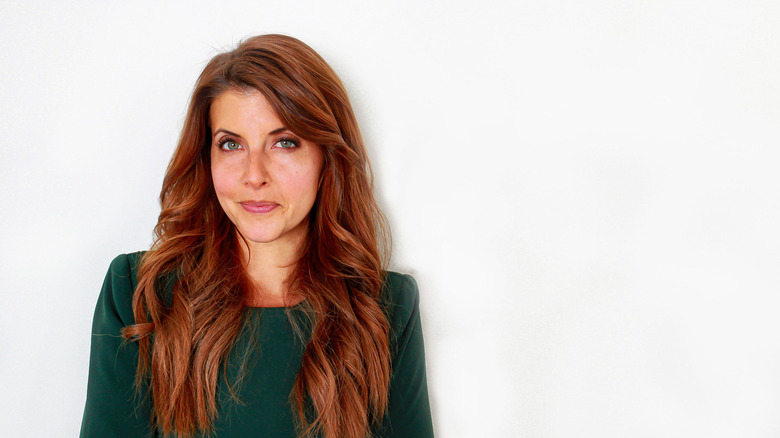
Lindsay Doyle
What kind of practices do you engage in to bring yourself closer to that authenticity?
I would say meditation has helped me more than anything because it allows me to notice what I’m doing in the moment and [to] stop and make a better choice that serves me or my clients or my company. It’s more value aligned. It serves my goals. It’s allowed me to be very aware when I am acting inauthentically. It’s that gross feeling that we all feel. It’s that awkward [feeling], that vibe, when I realize “I’m doing this for someone else. This story doesn’t belong to me. This value doesn’t belong to me. This is someone else’s.”
I don’t judge that. That’s fine for you to want and to value. I cannot follow in that direction because I know it just won’t work out for me. It won’t benefit me. And so noticing and not judging is key, because once you judge you’re in an emotional space, and then you’re anxious and you’re panicky, and you react instead of thoughtfully respond. And so being able to non-judgmentally notice in those moments … now I just laugh and go, “This isn’t mine.” And it’s easier to drop and walk away from and you don’t judge it. You go, “Ah, not that direction. No, thank you.” And move on. And there’s power behind that.
Number two, I would say keeping myself as physically and mentally healthy as possible. I know that even just a glass or two of wine, the next day my mood’s going to be off. I’m much more likely to be anxious or cognitively unclear. So I’m very mindful about my behavior in that way. I drink a ton more water. The basics. This is not rocket science. I’m not the first person to say this.
But putting yourself … I think we over-focus on a woman’s visual value. “Eat salads … because then you’ll be skinny.” And it’s like, “Okay, well not everyone.” I know plenty of women who are just fuller figured and they take great care of themselves. That’s just what their body looks like when they eat healthy. It doesn’t mean you’re going to be a stick figure. It means you’re strong and you’re healthy. If you exercise and eat clean and hydrate and get a good night’s sleep, whatever your body looks like after that, great! Whatever your brain does after that, great! It’s going to be better.
My brain is my business. My brain is the moneymaker. And so if that’s not clear or if it’s weighed down with other people’s stuff, it’s a barrier to me. So the mental and physical health is extremely important. And the meditation piece, I think those are what we call behavioral cusps. If you could master those things, it opens all these other doors to all these other things.
‘The power to do the choosing’
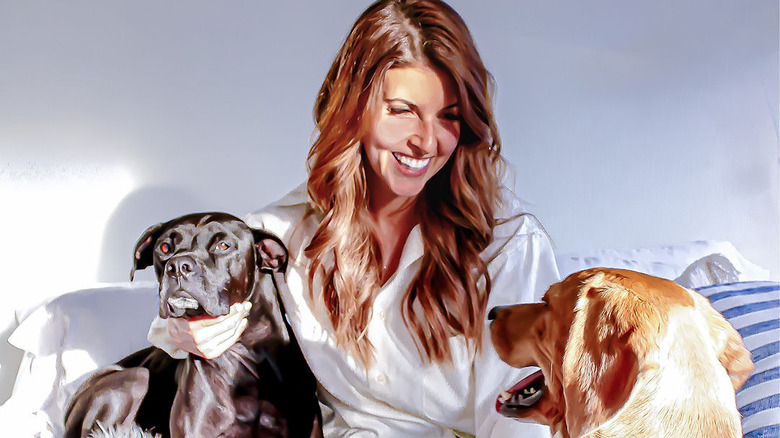
Lindsay Doyle
One of the things that you talk about frequently is the pressure that many women feel to have a partner. Can you tell us a little more about that?
Yeah! We were messaged from birth. One of the chapters in my book is called “Be Chosen.” And I remember being a little kid and noticing … I was so angry because I started looking around and I was being told what to do, wear, think, say. And I tell a story in my book about my mom saying, I think I dropped an F-bomb and I was 10, and my mom tried not to freak out about it. But she said, “Honey, boys won’t like you if you use that kind of language.” And so it’s just this message of “your behavior needs to orbit around a partner.” It messages that partners for women are very important, that they’re necessary. And nobody says that to little boys or to men! Men do the choosing.
I remember growing up to be an adult and thinking, “I need to think about if I would choose them.” I’m super ambitious. And so I’m like, “Oh, if the goal is to be chosen, I’m going to be chosen and [I’m going to] chameleon myself into something that you will choose.” Then I started dating a little bit more wisely, and I started thinking, “I’m not going to act to be chosen because you are not acting to be chosen. You’re just showing up. And that looks really fun. And you have this conquistador attitude that you’ve been raised with to just go be whatever you want to be.”
There’s this narrative of women: “Be liked and chosen. Men, be anything you want to be!” And that’s probably one of the biggest narratives that women can break, is not living in order to be … well, liked by everyone, but also to shape herself into something that is chosen. Because we have the power to do the choosing as well.
And I know there’s a biological component, wanting children. And I turn 40 in a couple weeks. I didn’t grow up really wanting to be the wife and the mom. I always thought, “Hey, if that happens, that’s great, but I’m going to go after what I can control and what I’m interested in.” … Awareness is really important. Looking at all the messages and how much time women spend preparing for the wife and nurturer role.
It gets into the main chapter in my book, the narrative of “be sexy but sweet.” It’s the notion that women are sexual, visual beings first, wives and caretakers and sacrificers second, and whatever else they have time for after that. Again, if that is very fulfilling for you to buy into that narrative and to live that way as a female, fine. But if you see that narrative and go, “I don’t want that to be true for me. I don’t want to live that way.” Then you’ve got to break the box. You have to smash out of that. And again, the awareness and noticing that that is a very strong narrative, I think is a first step.
Questioning the narratives
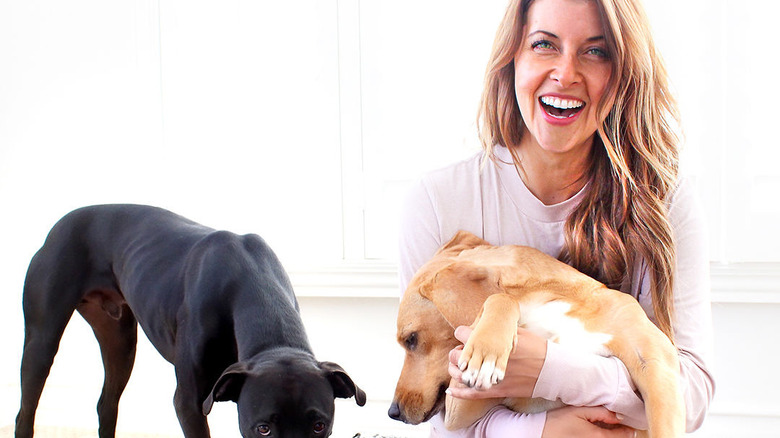
Lindsay Doyle
You have a list of questions that you suggest women ask before getting into a new relationship. So why those questions and why should women answer them?
It takes us out of the automatic behavior of, “Hey, my goal is to be liked and chosen, to have someone else tell me I’m beautiful and worthy, and I’m going to find my worth somewhere else.” If your worth lies in finding a partner and your self-value lies in finding a partner, your behavior will trend in that direction. And we get on the hamster wheel of automaticity, where it’s just … “I’ve got to be in shape because I want a partner. I’ve got to look this way. I have to act this way.” And it’s not even conscious.
I think it’s going to be very triggering for women to hear, “Hey, you spend an inordinate amount of time preparing to be chosen.” I would’ve been triggered by that until I assessed my own behavior with these questions. And I thought, oh my God, I’m a woman who’s been heralded her whole life for being independent and powerful and all these things. And [even] I do it!
I realized that I was waiting around [for] a man who didn’t yet exist, who I assumed would exist in the future. “Oh, I don’t want to move across the country and buy a house yet because that’s a commitment. And what if I meet someone?” “Oh, I hope whoever I date in the future wants to spend a year in Europe.” And I’m like, I’m making all these assumptions that there’s even going to be a partner in the future. And I’m hoping that they’ll want the same things, because if they don’t, then I won’t get those things either. And so I think that we give away our power that way, by waiting, by hesitating, by hedging our lives based on what [we think] a partner will find desirable.
So, asking those questions is a way to throw a wrench into that hamster wheel and stop it in its tracks and say, “Hey, I might ask myself all these questions and come out with the same answer. Yes. I still want a partner.” But at least you know why now. At least … it’s going to give you additional knowledge. And there’s also the possibility you might say, “Huh, I want to partner for the wrong reasons. This is a story that’s given to me by someone else. I’ve been choosing incorrectly because I haven’t asked myself these questions.”
Knowledge is always power. This is a prime example of knowledge is power. Because after you ask yourself these questions, any behavior you engage in after that is going to be truer and more authentic and more accurate to who you are, not for what other people want for you.
There are no relationship rules
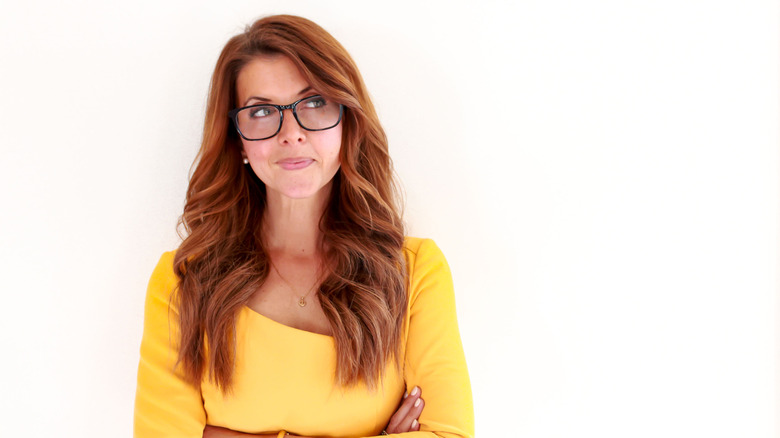
Lindsay Doyle
What are some of those questions to ask yourself?
The function of our behavior is extremely important. There are four categories of reasons we do anything. … And so if we say — “Well, why do I want a partner? Why do I have these feelings around being a partner?” — we can evaluate where this comes from. We can tease out those stories. “Is this a good time to have a partner?” This … is not about “be single forever … or relationships are terrible and they’re only going to encumber you.” No, not true. It’s being more mindful and intentional. And [asking], is now a good time for a partner?
I’m going to be 40 in a couple weeks. My book launch is right before my 40th birthday. This is not the time for me to go start dating. This is my time. This is my time. I’m doing interviews, I’m writing, I’m promoting the book. I’m doing all these things. It is not the right time for me. I’m not emotionally available, nor do I want to spend my time in a relationship. Is there going to be a better time in the future? Of course. Have there been better times in my past? Of course. So that’s important.
“What are the stories I hold surrounding the value of a partner? And where do they come from? And are they true for me?” Again, it’s really just excavating everything that we’ve been told. We’ve all had those moments where … we’re kids, we’re kids. We don’t know anything about the world. And so we just listen to whoever’s around and what seems to make sense. That’s how we, like, don’t touch hot stoves. “Don’t touch it.” “Oh, I’m going to touch it anyway.” “Yep. It’s hot. Don’t do that.” But then we grow up and think for ourselves and we build our own identities and we no longer have to abide by the rules of our parents or our professors or society in general. We can say, “You know what? I grew up dating men, but I’m actually interested in women too.” And that wasn’t a story that was ever okay, for me. But now that’s a story that I hold. I had beliefs around monogamy. I don’t really hold those anymore because that doesn’t come from my inside out. I logically and emotionally worked through that myself. Now I build my own boundaries about what’s acceptable to me in a relationship.
You learn at the end of the day, number one, there are no rules. Number two, as long as whoever is in the relationship is happy, fulfilled, healthy, and safe, and in agreement, you can do whatever you want! If you want to date eight people in a commune, go for it! You want to be monogamous with one person from the time you’re 13 until the time you die, go for it! As long as those people agree and are safe and are healthy, and are fulfilled by it, fantastic! The relationship’s working for you. I think relationships can add huge amounts of love and chemistry and all these things, it can really enhance your life. And sometimes they’re the opposite and they reel you [in], and limit you, and put you in a box. And it’s not a good thing. It doesn’t serve you. And so the questions are really just to get a bit more mindful.
The inspiration for her new book
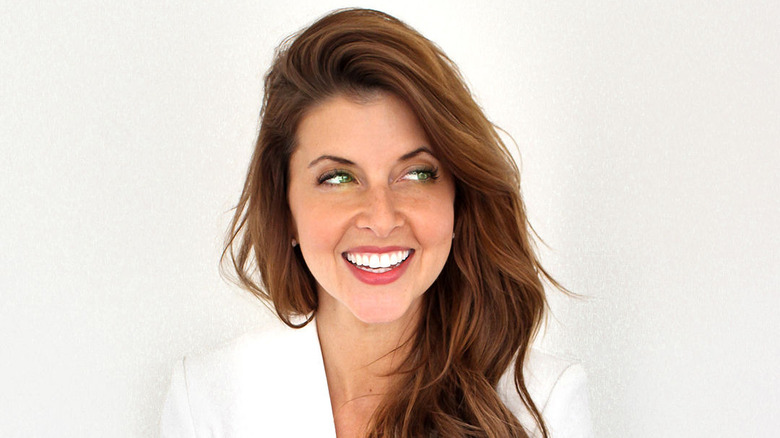
Lindsay Doyle
How did your work in this area lead you to your new book, “F**kless”?
Actually, the book led me to the work. I developed a company that goes into organizations and behaviorally evaluates the environment to say, “These are the variables that are responsible for your people not performing, getting burnt out, whatever the thing is.” We have seven to nine dimensions that we evaluate and we say, “Here are the actual variables that you need to change. And here’s how you can do that.” And they’re never what you think, because they’re scientifically and systematically evaluated. Then, through my company work, I started getting asked to do executive coaching, and so I took on that service line.
The book was born from my own anger and experience, and it was supported by the experiences of other people, women and men. And I interviewed the trans community as well. And so it was really just a labor of love, and something that I felt the need to get out there because it needed to be out there.
When people were saying, “Well, how are you going to use your book for your business?” I was like, “I don’t plan on that. I don’t really plan on that.” I just wanted to create something. The book started as a journal entry and after five pages … I’m an academic, I’m trained to just hate everything that I do and be critical, because it can always be better. But I wrote these first five pages of my journal entry and I went back to reread them and I thought, “This is good.” I never loved [my work immediately], but again, it came from inside out, right? And so the book, oh, took me two and a half years to write, and I incurred so much personal and professional trauma throughout those years. And the book ended up being what it’s being. But I touched on things, I happen to stumble upon things that people resonate with.
Now people will come to me as a coach and say, “I want to work on my identity and I want to break these barriers. I want to just take these narratives that I heard you talking about. Yeah. Yeah. I hear you have a book, but I’d like to be coached on my identity, on this gender role I’ve taken on that I don’t necessarily agree with. I don’t really know how I want to live from here, but I know what I’m doing isn’t working for me.” That does tie into wellbeing. There’s research out there that tells us that when young girls are shaped into this box of “You are a girl, so you have to be this,” it actually affects their mental health and their psychological wellbeing. And so it just happened to fit into the coaching and the wellbeing aspect.
But now, the work that I take on [in] the gender intelligence space is just that [much] more authentic to who I am. It came from the inside out. And now I get to do that too. So I feel really fortunate to be able to do that.
‘You are the boss of your own life’
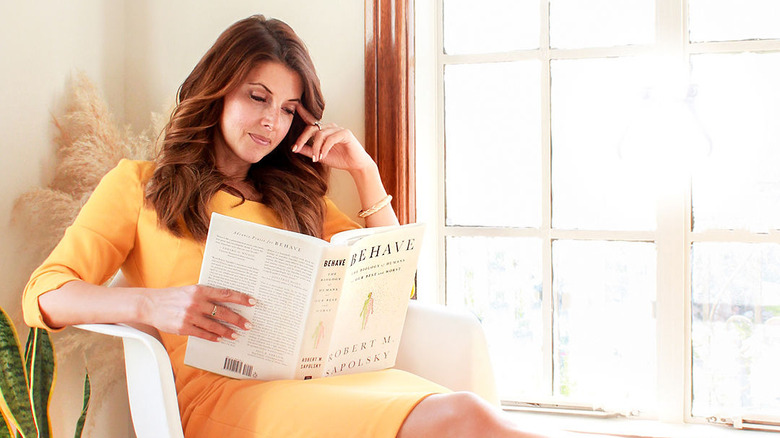
Lindsay Doyle
Of course, you have to tell us about that title. What inspired that title?
Because I’m in meditation practice, I’m extremely aware, and because I’m a Gemini East Coast Italian, I love words. I think language is really important. And so when I felt this feeling of being wild and unencumbered and just like, “Ha! That’s it. That’s the feeling. What’s that called?” It was “F**kless.”
I wrote the book and I titled it and I took it to all these publishers through all these connections that I have. And they were like, “No way, Ma’am.” “No way, girl, are you going to be able to publish that book. No one’s going to buy it.” And I said, “Well, they bought Mark Manson’s book. So is it that women can’t use the F-word in a title, or that no one can use an F-word?” Because we already know it’s not true. “So is it the fact that I’m a woman and I’m a tiny little thing that’s supposed to be cute? Or is it because I’m an academic and I’m supposed to be more rigid than that and serious?”
But I ended up going with Scribe Publishing, and they were like, “We love the title. Don’t change it if you don’t want to.” And so I said, “Okay.” And I will say, to be fair, my initial reaction [on submitting the book] was, “Oh, okay. You don’t like the title? I’ll just change it then. I’ll just change it to be more acceptable to the masses.” And then I was like, “That flies 100% in the face of the entire concept of this book. That’s not a good place for me to start. That’s not a good start to the book process.” And so I said, “Look, I’ve tried not to swear at all in the book. I’ve tried to think of different words for the title. I’m not going to do that, because from the inside out, that’s what the book is called. That’s the feeling that I have. That’s the feeling readers are going to get from doing the work and reading the book. We’re sticking with it, take it or leave it.”
What is the core message that you’re hoping to send with the book?
That you are the boss of your own life. That you don’t have to back up and make sure that your choices are okay with everyone else first. That life is very short. And that you only … I don’t believe that you only get one, but for the purposes of this [life], we’re here for a short amount of time and there’s a whole spectrum of lifestyles. There’s a whole spectrum of ways to live life. It’s my own personal belief that as long as you aren’t hurting yourself or other people on purpose or by accident, go do that. Explore this life that you’re given, explore who you are. I think the most important topic we will ever learn about is who we are. And the world does not need more of the same. It doesn’t need you to wake up every day and say, “Well, I’m just going to go copy that person.” Or, “I’m just going to go do what they’re doing, because it seems to work for them.”
There’s a magic that comes with living from the inside out and there’s power in living on your own terms to say, “I get to build this life.” And so I hope that the message that comes is that when you do that work, it’s scary and it sucks and it’s hard. And I say multiple times in the book, “If you’re not at the place to do this work, put the book down. It’s a smart decision to put the book down, come back to it later when you feel ready. I don’t want to change you by force or coercion. It has to be coming from you, from a truth.” There’s no feeling like this feeling. It’s liberating. It is life-giving. It is so enhancing. It adds color to your life, it adds dimension to your life when you can live in this way.
Changing workplace culture

Lindsay Doyle
You touched on this a little, but you’re also the founder of W3RKWELL. Can you tell us a little bit more about that side of your work?
Absolutely. I was, as I said, a clinician for a while. [I spent] a decade working with children, and it was really, really fulfilling. But I started to feel a constraint. I didn’t want my boss’s job, and I’m the one that needs a carrot. “How am I going to move forward and improve? Not necessarily for more money or up a ladder with a title, but how am I going to be able to fulfill my purpose and learn and grow?” And I couldn’t do that within the context of my clinical career at that time. …
I went to a leadership summit and I did my first values assessment, and I identified my values and I thought, “Oh my God, gosh, every single one of my values is being violated on a daily basis in my job.” I was good at my job. I was getting paid a good amount of money, [it was] flexible … all the things. Everybody was like, “Why are you unhappy? That’s wrong. Don’t feel that way. Just be happy.” That message, “Just be happy.” I was like, “I don’t want to just be happy. I’m content as a human, but I want more. And that is okay.”
And so I left the clinical field and I went to Europe for a month, and this was six weeks after I got married. I said, “Bye-bye, I’m leaving for six weeks.” I went with a friend to Europe for a month. And I just noticed them doing it differently. The siestas, all the differences came to mind. And I came back and I got really into meditation. I read James Doty’s book “Into the Magic Shop.” I learned about the neuroscience of meditation. And from there it was wellbeing. I wrote a really popular article that was very risky for me to write about wellbeing in my field. It propelled my career. I knew I had something.
So I said … this is the time where employee wellbeing programs were … just throwing yoga and salad and perks at people and calling it “wellbeing.” And as a behavior analyst, as we know, you can give someone all those things, yes. Yes, yoga. Yes, water. Yes, salads. Yes, rest. For sure. However, it doesn’t undo what you do to your employees when you send them back into that environment that shapes them into that stressed, burnt out, ineffective employee in the first place. You’re putting them back in the same environment. So you’re restoring them a little bit. You give them a little sip of air and then you send them back into the same environment and then you’re going, “Well, we checked our box.”
And so I said, “We need an analytical assessment.” And culture was a big buzzword. Nobody even knew what culture was. You can’t change and measure what you can’t define. And so I would talk to leaders and they’d say, “We want you to come and change our culture.” And I would say, “Define culture.” And everybody has a different definition, and they made it up and it wasn’t systematic. And I would say, “Okay. Culture is a process of reinforcement and punishment of behaviors in any given environment across any given time.” That’s culture, we can actually define it. And so we took off as an analytics company. We’ve done multiple iterations, keeping up with the greatest research available on how to evaluate those environmental variables.
It takes it out of, “Well, we need to be more engaged.” What does that mean? “We need better culture.” What does that mean? “We need new leadership.” What does that mean? It’s dialing it down. Turns out analytics are something that nobody else wants to do. I love solving problems, and I love just excavating and digging and then presenting you with a silver platter of, “Here’s exactly what you need. Here’s the low-hanging fruit that won’t cost you too much. Here’s this stuff that’s going to be more expensive that you can do later. Here’s what has visibility to your employees. This is your first priority because it will keep people from running out the door. It will just hold them in place for a second. And then you can change these things.” That turned into something I never thought it would be, but it’s just been such a great adventure.
Fighting burnout in the workplace

Lindsay Doyle
How do you help companies fight that burnout that happens in so many of our workplaces?
So we need to be systematic and scientific about it. … Our process is, “what is burnout?” There are three components to burnout. Performance decline, physical exhaustion, and cynicism — nobody’s happy, and things are not going to change.
The physical exhaustion, you can only do so much about because you can’t control life outside of work. You can’t control [that] people have kids and they have a sick parent and all the other things, but you can not add to the physical exhaustion. The performance decline. “Why is performance declining? Are you adequately trained? Is it a performance deficit? Is a skill deficit? Are you not motivated? Are you incorrectly motivated?” That’s a whole other thing. And the cynicism, I always start there because I say, “Look, it’s free to just care.” It’s free to gather your employees and be transparent and to say, “Here’s where we’re making mistakes.” Or, “Hey, there was a time where we had to be in a sprint. We don’t have to be in that sprint anymore, but we’re acting like we do. And that’s my bad. We got on this hamster wheel and I see it not working for us. It’s failing to work for us now. And so here’s what we’re going to do about it.” All of that is free. “How can we make this place better for you?” Learning to listen and care about your employees is free. And it takes that giant piece of cynicism away.
People will be exhausted at work. You can be the good exhausted, I guess. People’s performance will decline, but you can work on that. It’s a training issue. It’s a motivation issue, whatever. But starting with the cynicism is something that is free and it feels really good. Once we get past that point of defensiveness and digging their heels in, and “It’s not a me problem.” It’s like, there’s no blame here. There’s no blame, it is what it is. We’re just going to accept what’s happening or what has happened. What are we going to do about it? Every moment that passes is a missed opportunity to turn it all around.
The harder you dig in and the more you get defensive, the worse that this is going to get. So I work with first leaders and then the rest of the employees on decreasing that burnout. And there are protective factors to burnout: meaning, purpose, flexibility, all those types of things. And … it’s not always what you add, it’s what you remove. We remove the things that we can remove. And then we can add in the things that will protect employees.
Avoiding burnout in our daily lives

To branch off that a little bit, what kind of practices can people implement in their own lives to avoid burnout?
Setting their own boundaries. When you are exhausted and struggling and you don’t feel equipped to do the job that you’re hired to do, and you have questions and you are depressed, anxious, struggling, sleep deprived in any way, but you say, “Yeah, but I’m just going to keep doing it this way” — you send an unconscious message that this is all okay with you. And you’re part of that. We can complain about bosses and leaders all day, but behavior is bidirectional.
We have to refrain from the yeah, buts. “What if you talk to your leader about …” “Yeah, but I don’t know …” “Yeah, but everybody else does it.” “Yeah, but I can hang in for a little bit longer.” It’s like you’re hanging on by a thread for months or years. Building the confidence and the rootedness and, honestly, f**klessness, to build that boundary and say, “Here’s what I need. I’m teetering. I need help with this. I’d like more training on this.” At least you’re setting your own boundaries. If you’re my boss and I say, “Here are my boundaries,” now the ball’s in your court. You have the power to respect my boundaries or not respect my boundaries. And you behave and react. “Oh my gosh. I set my boundaries and my boss did such a great job receiving that information and respecting my boundaries. This is somewhere I want to stay.” Or you have a choice to go, “If those are your boundaries, it’s not going to work here.” And you set your own boundaries, right?
What do I do? Now I have a choice. … And again, I get it. I don’t want to run over the fact that times are very hard. People are struggling financially. And sometimes, you just got to get on with it and say, “Okay, I guess I’ll stay here then.” But, [if] you’re one foot out the door, the second, the second another job comes along, you’re gone. And guess what? Because I gave you the opportunity to respect my boundaries and you refused, you might not get the two-week notice that you’re looking for. You might not get the exit interview. I don’t care anymore, and so I just leave. And now I go badmouth the company. And so, in return for not respecting my boundaries, which were probably very reasonable, you have someone out there badmouthing your company. You have someone out there on Glassdoor or LinkedIn, whatever, using your company as a bad example. If you have any sense of morality, you’re probably not going to feel very good about your behavior.
And now you’ve got to find someone else. Do you know how much it costs to replace an employee? Sometimes that employee’s entire year’s salary, not to mention what damages are being done vocally out in the world. People underestimate the cost of that all the time. And so when working with CFOs that are like, “Well, what’s the return on investment in this program?” I said, “How much does it cost you to lose one employee?” And they either know or they don’t, but we come in under that every time on purpose. Because I’m sure that we can save you one employee.
Awesome. Thank you so much for taking the time to talk to us today.
For more information on Gianna Biscontini’s forthcoming book, “F**kless: The Guide to Wild, Unencumbered Freedom,” please visit her website.

